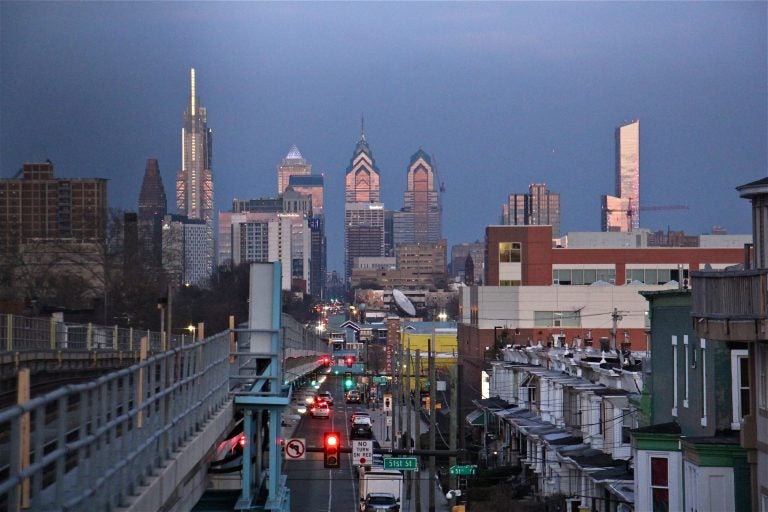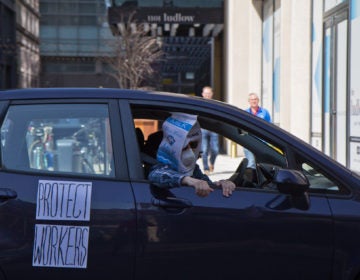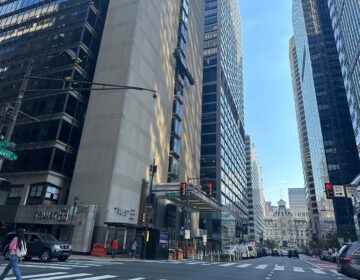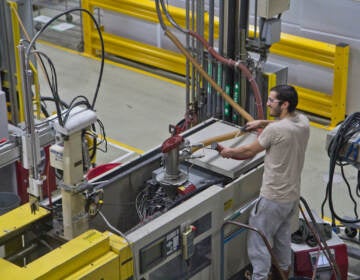Philadelphia underperforms national economy, according to Pew report
Philadelphia’s economy has been hit hard by the pandemic, a new Pew Charitable Trusts study finds.

A view of the Philadelphia skyline from the 52nd Street station on the Market-Frankford elevated line in West Philadelphia. (Emma Lee/WHYY)
Philadelphia has underperformed compared to the national economy since the COVID-19 pandemic began, while job losses in the city continue to linger, according to a new Pew Charitable Trusts report — a collaboration with the William Penn Foundation.
The first in a series called “Philadelphia’s Fiscal Future,” the report also finds that pandemic trends such as work-from-home and reduced travel activity will impact the city’s future economy because people will spend less money.
“The city’s economy has not yet fully recovered from the economic shock of the pandemic and we can be pretty confident that some of the changes brought on by that shock will be long lasting,” said Larry Eichel, senior adviser with The Pew Charitable Trusts’ Philadelphia research and policy initiative.
The new report examines the pandemic’s impact on Philadelphia’s economy and jobs, evaluates who has been most affected over the past couple years, and explores the impact the pandemic might have on the city’s economic future through 2025.
The series also analyzes scenarios that would affect the city budget, its ability to raise revenue through its current taxes, and factors that could put pressure on the city’s fiscal stability once federal money from the American Rescue Plan Act runs out.
“The goal of this work is to help policymakers determine how they can help Philadelphia’s economy grow in a way that provides jobs and career prospects for residents throughout the city,” Eichel said.
“For people with various levels of education and training, members of all racial and ethnic groups, we’re also striving to help officials decide whether and how to adjust city fiscal policies to ensure that Philadelphia has sufficient funds to provide needed services for its population without deterring economic growth.”
The study found that Black workers, female workers, and non-college educated workers had disproportionately high shares of pandemic-related job losses from 2019 to 2021, according to the report.
Low-wage jobs in Philadelphia, including in the hospitality and retail sectors, were greatly impacted during the pandemic. These kinds of jobs faced a -24.2% change from 2019 to 2021 — compared to just a -2% change for high-wage jobs, such as those in finance. Middle-wage jobs, which include those in healthcare and education, had a -7% change.
The report also finds that pandemic-related trends have the potential to affect the future of Philadelphia’s economy. For example, 11,000 to 19,000 Philadelphia workers who didn’t work remotely prior to the pandemic will work from home by 2025, the study estimates. That represents about 14% to 27% of workers.
“That’s a big number, and it has lots of implications for the city in terms of, businesses rely on people who come into their place at work, on taxes that are generated as a result, on public transit, on restaurants and stores and on city revenues,” Eichel said.
Fewer people in the city during the day could impact demand for office space, public transit, restaurants and retail, according to Pew, and that could reduce city revenue from wage, sales, and business taxes. Pew said that it could be a noticeable change, because in-commuters tend to have higher wages than out-commuters, and because city residents staying at home will likely spend less money each day than if they went to a workplace with food, beverage and retail options nearby.
The next report will examine four scenarios for how Philadelphia’s economy might develop over the next few years.
“These are not predictions but a range of possibilities of what the city’s economy might look like in a few years, what the job totals might look like, what sectors might do well and not so well, just to give the public and policymakers an idea of the range of possibilities and the stakes,” he said. “Also, the impact of those scenarios on the city’s tax revenues and on the city’s ability to raise money to fund these services, and pay salaries.”
Disclosure: The William Penn Foundation supports WHYY.

Saturdays just got more interesting.
WHYY is your source for fact-based, in-depth journalism and information. As a nonprofit organization, we rely on financial support from readers like you. Please give today.





![CoronavirusPandemic_1024x512[1]](https://whyy.org/wp-content/uploads/2020/03/CoronavirusPandemic_1024x5121-300x150.jpg)


